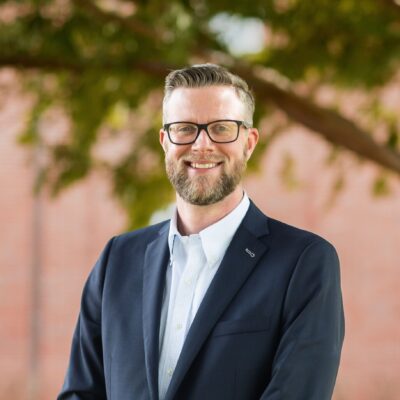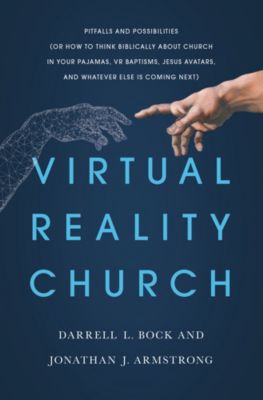
By Jason Thacker
Just as the shutdowns began in March 2020 in light of the COVID-19 pandemic, I distinctly remember tweeting how encouraging it was to see a number of pastors and ministry leaders jumping on social media to update their people on church gatherings and to encourage them in that time of uneasiness.
Throughout the pandemic, pastors across the nation (and world) sought to navigate the unknown, and many picked up a new set of technical skills as they sought to take their church gatherings online for the first time and connected to their people, albeit digitally.
During this pandemic, we had technology forced upon us in order to stay connected with one another, and we became inundated with resources, online gatherings, and options in our digital culture. While this season has been extremely difficult for everyone in different ways, technology has been an amazing gift from God where countless people have heard the gospel for the first time, and many more have deepened their relationships with God, the church, and their families through discipleship.
According to Lifeway Research, pastors and ministry leaders reported that one of the biggest changes in their churches during the pandemic has been that the frequency of communication with their people has dramatically increased, but more in-depth connections have faltered as face-to-face communication has been limited. More than 16% of those surveyed also said that technology became a main concern in their church, especially as it has caused pressures and stresses on leaders as they try to navigate technical limitations and glitches.
There will be no return exactly to the pre-pandemic normal, as the use of new technologies in churches will not suddenly vanish. Click To TweetOutside of the ministry context, technology has also dramatically altered our daily rhythms as families and individuals spent countless hours glued to our devices streaming church gatherings, small groups, family events, work, and school—as well as increased time decompressing through streaming video, media entertainment, and constant scrolling.
As our communities seek a return to normal as this pandemic seems to be subsiding, here are two things to keep in mind about our relationship with technology, especially in the context of the local church.
First, we won’t return to pre-pandemic life, and that can be a good thing.
While it may sound odd to say we won’t be returning to “normal” per se, the reality is our use of technology in the church won’t suddenly go away. This is because many of these tools can be helpful in ministering to those around us and reaching new people with the message of the gospel. In their book Virtual Reality Church, Jonathan Armstrong and Darrell Bock show how the church has embraced technical changes throughout her history, especially in a rapidly changing culture. But pursuing technological innovation for innovation’s sake is a dangerous path to pursue. A Christian ethical vision for technology starts from a place of understanding some fundamental questions of who God is, who we are as His image-bearers, and the proper role of technology in our lives.
A Christian ethical vision for technology starts from a place of understanding some fundamental questions of who God is, who we are as His image-bearers, and the proper role of technology in our lives. — @jasonthacker Click To TweetGod calls His people to pursue wisdom as we seek to love Him and love our neighbor as ourselves (Matthew 22:37-39). This means we must keep ethics (or discipleship) at the forefront of our pursuit of technology because we recognize technology shapes us in countless ways. We live in a world of overflowing information, countless distractions, and constant—often shallow—connections with others. Our technological tools aid and encourage this distraction as technology pushes us toward greater efficiency and productivity.
In his book Disruptive Witness, Alan Noble says technology alters our perception of the world around us, especially how we go about knowing and sharing truth. In a time of rampant individualism, it is easy for each of us—including our churches—to treat the truths of the gospel and the nature of the church as yet another option among many and to downgrade the transcendent realities of God to just another piece of programing on TV or online video. Noble highlights Canadian philosopher Charles Taylor’s concept of the “buffered self,” where we as individuals essentially cut ourselves off from being affected by the transcendent by simply treating everything in materialistic terms. We order our lives as mere individuals living in a world of options and personal choices, where transcendent truths like the gospel become more about personal or fashionable choices that have little impact on our daily lives.
The COVID-19 pandemic simply sped up this shift in our society, as everyday things like our church gatherings, family outings, work, travel, and even dinners with others have become incredibly mediated or even completely digital. Since we have experienced such a surge in social and technological change so quickly, there really isn’t a way to just simply go back to the way things were before COVID, given our growing dependence on these tools. Once these changes take place, history shows it is difficult to return to a pre-technological method. For good or ill, this is the new environment we inhabit, and the church’s job is to be, as Noble puts it, a “disruptive witness.”
For good or ill, this is the new environment that we inhabit, and the church’s job is to be, as @TheAlanNoble puts it, a “disruptive witness.” — @jasonthacker Click To TweetBut this does not mean we are without hope, or that somehow these technological shifts have permanently altered our churches for the worst. While technology will continue to alter our perceptions of the world, technological efficiency is not inevitable as we are still responsible for our actions and uses of technology. Church leaders, above all, need to recognize these shifts in our people and how they think about the world around them in order to live out our callings of leading the church toward more effective ministry in the coming days, weeks, and years.
Second, we can embrace technology in its proper role once we know how it is shaping us and our communities.
One of the common refrains I hear from ministry leaders and pastors, especially in this season, is, what are we to do moving forward? Do we keep our online gatherings and small groups? Do we stop offering Zoom training sessions and business meetings? What do we do about the rise of fake news, misinformation, and even conspiracy theories? Isn’t social media and technology just distracting us from the real work of the ministry? These are valid concerns we can address in light of the reality of how technology is shaping our lives each day.
Grounded in an understanding of who God is, who we are as His image bearers, and a proper understanding of technology, the church can seek to use these tools not as simple substitutes for real embodied community, but in ways to reach others and disciple them, contrary to the individualistic culture we have become accustomed to in recent decades. We have the opportunity to help reframe how our people view our technological society all around us, as we recognize and seek to live out the fundamental realities of the Christian ethical worldview.
We have the opportunity to help reframe how our people view our technological society, as we recognize and seek to live out the realities of the Christian worldview. — @jasonthacker Click To TweetPractically, this means that as we evaluate the use of technology in the church, we need to be asking how these methods affect what we are trying to communicate. If we overly rely on a digital gathering for the church and use it as a substitute for embodied worship, could we be relaying a message that the embodiment of relationships and physical connections are less important than simply communicating information from the Scriptures?
Is the church simply a place to learn new information, or is it a place of more significant and eternal consequence? If we offer an online or completely individualized communion, are we subtly communicating that the body of Christ is merely a group of loosely tied individuals and that the elements are not important in themselves? Or, if we forsake dinner with our small group or being physically present in suffering, are we communicating that our relationships are based simply on convenience and efficiency rather than an intimate connection with one another reflecting a grander reality of God’s relationship with us?
The church has the opportunity to step into these ethical quandaries and complex issues in ways that run contrary to prevailing notions focused on convenience, efficiency, and productivity. We are to proclaim a more holistic understanding of human life and community that is centered around a transcendent reality of a God that speaks to us, knows us, and calls us to proclaim His message of salvation to the people around us.
In the digital age, we are called to be “shrewd as serpents and as innocent as doves," especially given the immense challenges we are facing today. — @jasonthacker Click To TweetWhile this pandemic has uniquely challenged each of us and pushed many of us outside of our comfort zones, we live in an opportune time to proclaim the goodness of God’s design for humanity and His church. Especially in a contentious and overwhelming time, many of our neighbors may actually be more apt to hear this message, given that all of our worlds have been turned upside down by this pandemic.
Overall, the church must remember we need not fear technical innovation given our hope rooted in the coming age and in the current reign of the resurrected Christ. Nor do we need to rush headlong into technical innovation, as if these technologies do not shape or alter how we see the world around us. In the digital age, we are called to be “shrewd as serpents and as innocent as doves” (Matthew 10:16), especially given the immense challenges we are facing today.

Jason Thacker
Jason serves as assistant professor of philosophy and ethics at Boyce College and Southern Seminary. He also is a senior fellow and director of the research institute at The Ethics and Religious Liberty Commission.








